
Sir Edward Nicholas Coventry Braddon was an Australian politician who served as Premier of Tasmania from 1894 to 1899, and was a Member of the First Australian Parliament in the House of Representatives. Braddon was a Tasmanian delegate to the Constitutional Conventions.

Sir John Quick was an Australian lawyer, politician and judge. He played a prominent role in the movement for Federation and the drafting of the Australian constitution, later writing several works on Australian constitutional law. He began his political career in the Victorian Legislative Assembly (1880–1889) and later won election to the House of Representatives at the first federal election in 1901. He served as Postmaster-General in the third Deakin Government (1909–1910). He lost his seat in 1913 and ended his public service as deputy president of the Commonwealth Court of Conciliation and Arbitration (1922–1930).

Sir Alexander James Peacock was an Australian politician who served as the 20th Premier of Victoria.
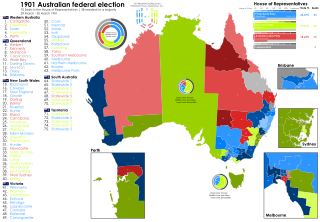
The 1901 Australian federal election for the inaugural Parliament of Australia was held in Australia on Friday 29 March and Saturday 30 March 1901. The elections followed Federation and the establishment of the Commonwealth of Australia on 1 January 1901. All 75 seats in the Australian House of Representatives, six of which were uncontested, as well as all 36 seats in the Australian Senate, were up for election.
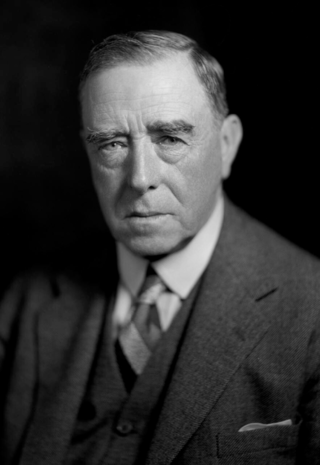
Sir Stanley Seymour Argyle KBE, MRCS, LRCP, was an Australian radiologist and politician. He served as premier of Victoria from 1932 to 1935 and was the state leader of the Nationalist Party and United Australia Party from 1930 until his death in 1940.

Norman Kirkwood Ewing, Australian politician, was a member of three parliaments: the Western Australian Legislative Assembly, the Australian Senate, and the Tasmanian House of Assembly. He became a Judge of the Supreme Court of Tasmania, and was Administrator of Tasmania from November 1923 to June 1924.

Frederick Illingworth, was an Australian politician, who was a Member of Parliament in two Australian colonies, and a government minister in Western Australia. As a financer of land speculation in Victoria in the 1880s, he was heavily involved in the Victorian land boom.
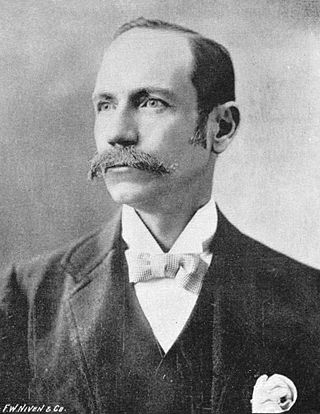
Sir Edward Horne Wittenoom KCMG was an Australian politician who served intermittently in the Legislative Council of Western Australia between 1883 and 1934, including as President of the Legislative Council from 1922 to 1926. He sat in the Legislative Council from 1883 to 1884, 1885 to 1886, 1894 to 1898, 1902 to 1906, and finally from 1910 to 1934. Wittenoom was a minister in the government of Sir John Forrest, and was also Agent-General for Western Australia between 1898 and 1901.
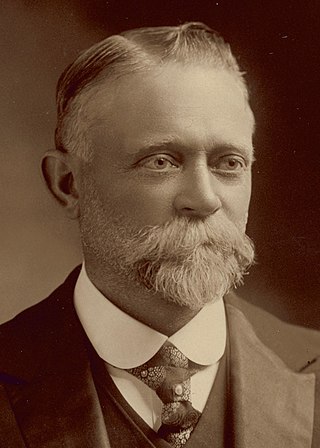
Samuel Mauger was an Australian social reformer and politician. He served in the Victorian Legislative Assembly (1900–1901) and the Australian House of Representatives (1901–1910), including as Postmaster-General in the Deakin government (1907–1908). He championed a number of political causes, including workers' rights, protectionism and temperance.

Francis Brennan was an Australian lawyer and politician. He was a member of the Australian Labor Party (ALP) and served as Attorney-General in the Scullin government (1929–1932). He was a member of the House of Representatives for over 35 years, one of the longest periods of service. His brother Tom Brennan was a United Australia Party senator, a rare instance of family members representing opposing parties.

Edward Davis Millen was an Australian journalist and politician who served as the first Minister for Repatriation.
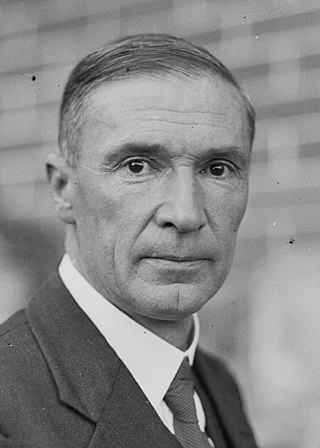
Thomas Paterson was an Australian politician who served as deputy leader of the Country Party from 1929 to 1937. He held ministerial office in the governments of Stanley Bruce and Joseph Lyons, representing the Division of Gippsland in Victoria from 1922 to 1943. He played a leading role in the creation of the Victorian Country Party as the political arm of the Victorian Farmers' Union.

James Hiers McColl was an Australian politician. Prior to Federation in 1901, he was a member of the Victorian Legislative Assembly (1886–1900) and twice held ministerial office. He was known for his interest in agriculture, particularly new irrigation techniques. In the new federal parliament he first represented the Division of Echuca (1901–1906) in the House of Representatives and then served as a Senator for Victoria (1907–1914). He was Vice-President of the Executive Council in the Cook Government (1913–1914).

Reginald Thomas Pollard was an Australian politician. He was a member of the Australian Labor Party (ALP) and served in the Victorian Legislative Assembly (1924–1932) and House of Representatives (1937–1966). He was Minister for Commerce and Agriculture (1946–1949) in the Chifley government.

Edward Findley was an Australian politician and publisher. He served as a Senator for Victoria from 1904 to 1917 and from 1923 to 1929, representing the Australian Labor Party (ALP). He was also a member of the Victorian Legislative Assembly from 1900 to 1901.

Arthur Hill Griffith was a politician, teacher and patent attorney in New South Wales, Australia. He was a member of the New South Wales Legislative Assembly from 1894 until 1917 and held a number of ministerial positions in the Government of New South Wales. He was a member of the Labor Party.

The 1930 New South Wales state election was held on 25 October 1930. The election was conducted in single member constituencies with compulsory preferential voting. The election occurred at the height of the Great Depression and was a landslide victory for the expansionary monetary policies of Jack Lang.

The Barton government was the first federal executive government of the Commonwealth of Australia. It was led by Prime Minister Sir Edmund Barton, from 1 January 1901 until 24 September 1903, when Barton resigned to become one of the three founding judges of the High Court of Australia.

Hon. Patrick Perkins, J. P.,, nicknamed Paddy Perkins, was a brewer and politician in colonial Queensland. He was a Member of the Queensland Legislative Assembly and, later, a Member of the Queensland Legislative Council.
This is a list of members of the Victorian Legislative Assembly, from the elections of 1 November 1900 to the elections of 1 October 1902. From 1889 there were 95 seats in the Assembly. Several members resigned to take up seats in the first Australian Parliament.



















